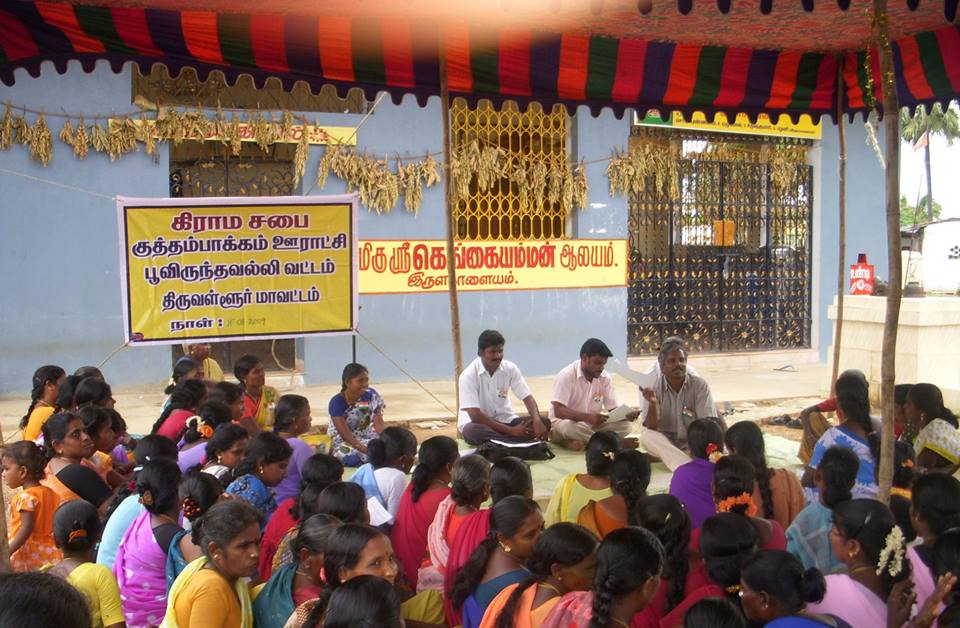
TN govt defers May 1 gram sabha meetings, activists cry foul

The father of the nation, Mahatma Gandhi, would have been uneasy with the pace at which the Tamil Nadu government goes about handling its three-tier panchayati raj system. For, the Mahatma, who believed that the ‘Future of India lies in its villages,’ would not have digested the undue delay in the conduct of gram sabha meetings.
Gram sabha meetings should be conducted on January 26, May 1, August 15, and October 2 every year. In Tamil Nadu, the gram sabhas have been convened in the past three years without elected panchayats. The rule is that gram sabhas can only be convened after an elected panchayat is in place. (The three tiers include, district, block, and village panchayats, in the descending order. The names may change from state to state). If there is no elected panchayat, a designated government official should convene the gram sabha.
Initially, the Panchayati Raj came under the directive principles. It attained Constitutional status in 1993, after the 73rd amendment.
The third tier
Being the third tier of governance, after the Centre and the state, the Constitution makers had envisaged a critical role for the panchayats. The gram sabhas should act as direction bodies for the panchayats.
On April 29, 2019, the state government issued an order stating that the gram sabha meetings of May 1 have been postponed as the Election Commission’s model code of conduct (MCC) was in force. This created an uproar among civil society groups. They say gram sabha meetings are being convened in states like Bihar where the MCC is in place.
Advance notice
K Saravanan, president, Thannaatchi, an organisation working towards creating awareness on Panchayat Raj, says, the cancellation of gram sabha meetings should have been intimated seven days in advance. But the Directorate of Rural Development and Panchayat Raj issued order only two days ago. “Does the MCC restrain the conduct of gram sabha meetings? No. A circular from the Election Commission of India sent to the Ministry of Panchayat Raj underlines that there is no ban on the conduct of gram sabha meetings when the MCC is in place. However, the circular says, no new schemes or propaganda of the ruling party should be encouraged,” he said. The circular was sent on October 10, 2018, when elections were conducted in five states – Rajasthan, Telengana, Chhattisgarh, Mizoram and Madhya Pradesh.
However, R Elango, former panchayat president of Kuthambakkam, has a different opinion. He says gram sabha meetings becomes null and void when there is no elected panchayat is in place. “According to the Constitution, the gram sabha meetings should be organised by the panchayat president or vice-president. In the absence of both, a senior ward member can organise the meetings. Or the panchayat should assign someone like retired teachers to conduct gram sabha meetings in the presence of panchayat body members. While the state has no elected local bodies, conducting gram sabha meetings becomes meaningless,” he says.
Bad record
After the 73rd Amendment, TN has always had a bad record in terms of conducting local body polls. TN remains the only state which has not conducted a local body election in the past three years. “Local bodies are in itself a government for the villages. When there is no panchayat in place, the government cannot ask the block development officers (BDO) to convene gram sabha meetings. Meanwhile, since panchayats are separate bodies, the election commission has no powers to stall the meetings,” he adds. Currently, the government has appointed 385 BDOs as ‘special officers’ for the 12,524 village panchayats in the state.
Fear of power centres
“The stress on the conduct of gram sabha meetings, even in the absence of elected panchayats, is to encourage and increase people’s participation in governance,” says Nandakumar Shiva, a Panchayat Raj activist and general secretary of Thannaatchi. The organisation has been training youths in the state in local body affairs. Grama sabhas are the only place where villagers can raise questions against the people who govern them, he adds. He said the state government feared the creation of micro-power centres if the panchayats were empowered. Any project would require the assent of the panchayat to implement projects at the village level, he added.
G Palanithurai, former professor at Gandhigram Rural Institute and scholar in Panchayat Raj studies, says, there is no compulsion on the conduct of gram sabha meetings on the designated dates. “The election code of conduct is in force only for the four by-poll constituencies. The gram sabha meetings, if not conducted on said date, should be conducted on any other day. The problem is not about conducting the meetings, but diminishing the significance of the local bodies, though the constitution acknowledges the local bodies with separate powers,” he said.
During the recent electoral campaigns, people across the state echoed their grievances – mostly civic issues like non-availability of road and other amenities, he said. “If local bodies were there, those issues would not have been so rampant,” Palanithurai said.


